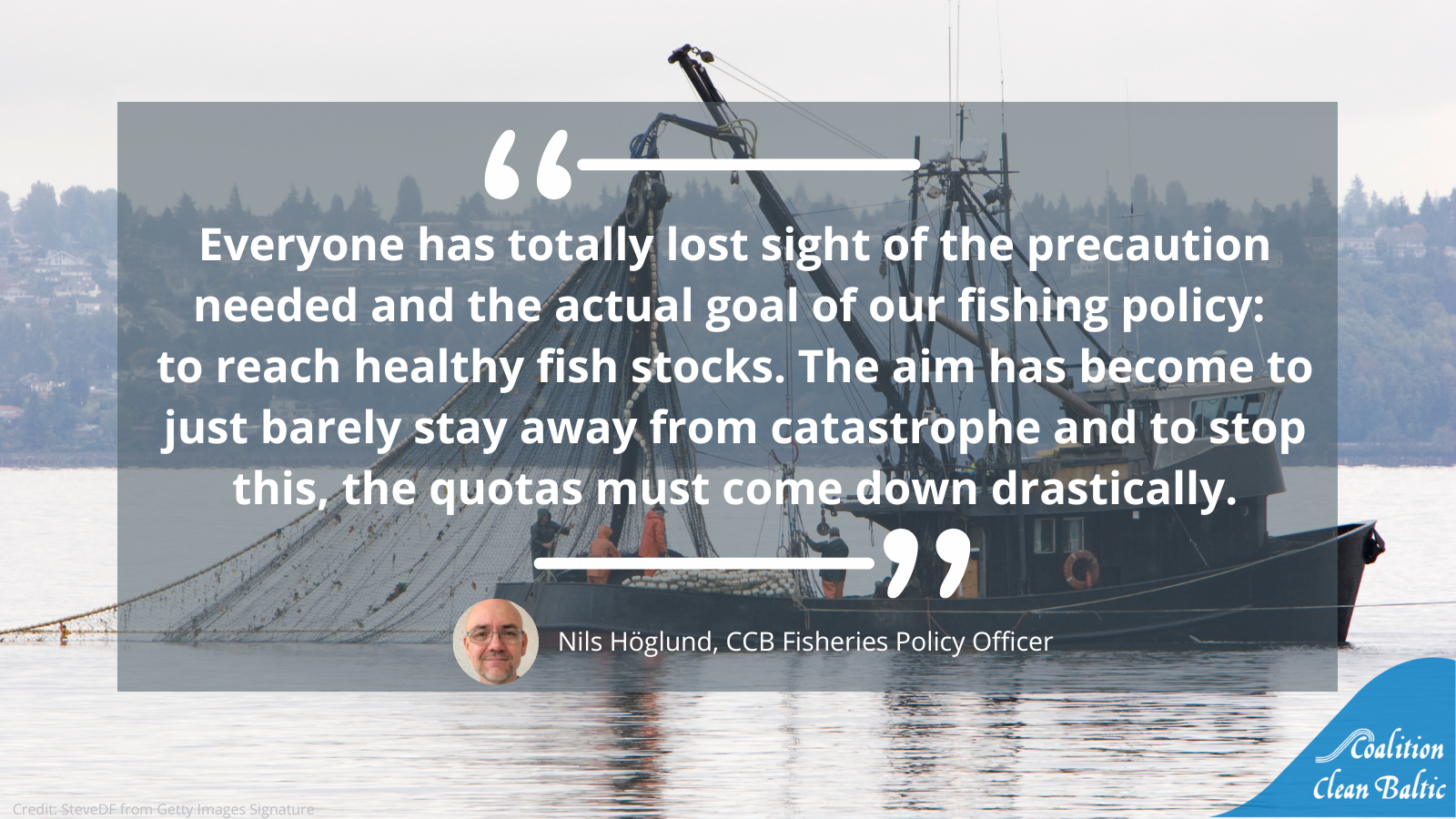NGOs call on decision makers to do right by the Baltic Sea ecosystem – new scientific advice shows that Baltic fish stocks are still under stress
On Friday, 31 May, the International Council for the Exploration of the Seas (ICES) published its scientific advice on how much fish can be caught in the Baltic Sea next year [1]. The numbers show that the Baltic Sea ecosystem and fish stocks remain in severe distress and that even the cuts in catches that have been made over the past years are not enough to bring stocks back to healthy levels. NGOs and small-scale fishermen alike call for a drastic overhaul of the current fisheries management that should put the health of the Baltic Sea ecosystem at its centre.

June 3, 2024 – The decline of fish population in the Baltic Sea has been well documented. It started with salmon and cod over 20 years ago, then the herring stocks started to dwindle until now even the previously abundant sprat stock has entered a free fall. The cause behind this is that fishing pressure is still too high, each year more is taken then can be replenished, leading the ecosystem in a downward spiral.
The main reason for this is that the political choice has been made to set fishing quotas around the lowest level of fish abundance that will avert collapse. This goes against both the EU law as well as common sense, the law stipulates that quota levels should aim for strong fish stocks that can sustain a fishery without being at risk. For example, the scientific advice for central Baltic herring shows that we are far from the target level for a resilient fish stock and there is only a slim probability that this level will be reached in 2026.
“The sad reality is that there is no herring along the coasts, and coastal fishermen have just about given up. The scientists have again produced advice on stocks that are far from stable in numbers and size. This time even the experts indicate that they do not trust in their own models and data”, says Nils Höglund, Fisheries Policy Officer at Coalition Clean Baltic (CCB) - “Everyone has totally lost sight of the precaution needed and the actual goal of our fishing policy: to reach healthy fish stocks. The aim has become to just barely stay away from catastrophe and to stop this, the quotas must come down drastically”.
The scientific advice from ICES released today shows that most stocks are not recovering or are even declining further. Cod and western herring have been at historically low levels for several years now but now sprat has joined this somber list. The catch advice for this year is nearly 20% lower than last year. This is of high concern as sprat are a vital food source for many seabirds, large fish and marine mammals, species that are already under severe pressure in the Baltic Sea.
“This depressing conclusion on the new advice has to be that managers simply have not done enough to help some of these stocks recover”, says Lina Birgersson, project coordinator at FishSec - “In some cases we even see them trying to reduce the few legal safeguards we have so they can continue to allow fishing even when the scientific analysis shows these stocks to be in an unhealthy state, this is not ecosystem based management, this is fishing down the food web”.
"The critical situation for the Baltic Sea demands immediate action. The latest ICES data confirms that key species like sprat, cod, and herring continue to face critically low population levels, threatening the entire marine ecosystem. This year’s EU negotiations aren’t just routine — they are a crucial opportunity to redefine our approach and implement quotas that will allow these stocks to recover. It’s time to act decisively to preserve the Baltic Sea for future generations," says Konrad Stralka, CEO of BalticWaters.
For both cod stocks in the Baltic, the situation remains critical and with no sign of improvement even though no fishing for Eastern cod has been allowed in the past three years. ICES indicates that catches of western cod along the German, Danish and Swedish coasts need to be reduced and advises a maximum of only 24 tonnes in total, comprising both commercial bycatch and catches by recreational anglers. This affects other stocks too, in particular plaice. Even though the ICES advice notes that more plaice can be fished in the Baltic Sea this is problematic since plaice is mainly caught with bottom trawling gear which can have high levels of cod as bycatch. ICES states in the advice that: “there are gears available that successfully reduce cod bycatches in the flatfish fisheries; however, these active gears are not currently in use”.
“Despite the closure of the cod fishery, cod is still being caught as by-catch by bottom trawlers fishing after flatfish like plaice. We must reduce cod by-catch by introducing bottom trawl free zones in key cod areas as well as electronic monitoring on trawl boats to stop illegal discarding of cod”, says Cathrine Pedersen Schirmer, Chief Advisor at the Danish Society for Nature Conservation.
“Despite the closure of the cod fishery, cod is still being caught as bycatch by bottom trawlers fishing after flatfish like plaice. We must reduce cod bycatch by introducing bottom trawl free zones in key cod areas as well as introduce mandatory electronic monitoring on trawl boats to stop illegal discarding of cod”, says Cathrine Pedersen Schirmer, Chief Advisor at the Danish Society for Nature Conservation.
“In 2013 the EU reformed its fisheries policy promising a new era with healthy fish stocks. Since then, the fish biomass in the Baltic has declined by around 800.000 tonnes while catches have shrunk by 130.000 tonnes (40% from the closed cod fishery). Implementing the ICES advice will not bring our stocks back. Coastal fishermen are clear: cut the quotas and restrict the trawl fishery for herring, sprat and plaice", says Christian Tsangarides, Baltic & North Sea Coordinator at Low Impact Fishers of Europe, LIFE.
END
***
Coalition Clean Baltic (CCB) – Is a politically independent, non-profit association, which unites 27 NGOs, with over 1 500 000 members in all countries around the Baltic Sea. The main goal of CCB is to promote the protection and improvement of the Baltic Sea environment and its natural resources for present and future generations. More info at: www.ccb.se
FishSec – Is a politically independent non-profit organisation. We are dedicated to the protection and restoration of marine ecosystem services, with a focus on fisheries. www.fishsec.org
Danish Society for Nature Conservation – It is a membership based environmental organisation that works to conserve nature and the environment in Denmark through local work, conservation, lobbying and specific projects. www.dn.dk
BalticWaters – Is an independent foundation engaged in efforts to improve the Baltic Sea environment. The foundation conducts large-scale environmental projects with focus on action-oriented measures and applied research to show which measures can contribute to a healthier sea and viable fish stocks. More about BalticWaters at: https://balticwaters.org
Low Impact Fishers of Europe (LIFE Platform) – is an EU-wide platform of associations of small-scale fishers committed to fishing in a low impact manner while maximising their socio-economic impact. Small-scale fishing is part of the solution, and LIFE’s mission is to unite small-scale fishers to achieve fair fisheries, healthy seas and vibrant communities. More about LIFE at: https://lifeplatform.eu
CONTACT
Nils Höglund: nils.hoglund@ccb.s
Lina Birgersson: lina.birgersson@fishsec.org
Konrad Stralka: konrad.stralka@balticwaters.org
Cathrine Pedersen Schirmer: cathrine@dn.dk
Christian Tsangarides: bans@lifeplatform.eu, +46 76 405 6675
[1] LINKS TO ADVICE:
- Eastern Baltic cod
- Western Baltic herring
- Central Baltic herring
- Gulf of Riga herring
- Baltic sprat
- Baltic plaice SD 21-23
- Baltic plaice SD 24-32
- Main basin salmon
- Gulf of Finland salmon


